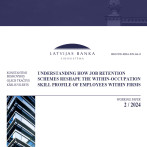ECB Convergence Report 2013 June
This Convergence Report has been prepared following a request for country examination submitted by Latvia on 5 March 2013. In producing this report, the ECB fulfils its requirement under Article 140 of the Treaty on the Functioning of the European Union (hereinafter the "Treaty") to report to the Council of the European Union (EU Council) at the request of an EU Member State with a derogation "on the progress made by the Member States with a derogation in fulfilling their obligations regarding the achievement of economic and monetary union". The same mandate has been given to the European Commission, which has also prepared a report, and both reports are being submitted to the EU Council in parallel.
In this report, the ECB uses the framework applied in its previous Convergence Reports. It examines whether a high degree of sustainable economic convergence has been achieved in Latvia, whether the national legislation is compatible with the Treaty and the Statute of the European System of Central Banks and of the European Central Bank (Statute) and whether the statutory requirements are fulfilled for Latvijas Banka to become an integral part of the Eurosystem.
This report is structured as follows. Chapter 2 describes the framework used for the examination of economic and legal convergence. Chapter 3 contains a country summary, which provides the main results of the examination of economic and legal convergence in Latvia. Chapter 4 examines in more detail the state of economic convergence in the country and provides an overview of the convergence indicators and the statistical methodology used to compile these indicators. Finally, Chapter 5 examines the compatibility of the national legislation in Latvia, including the statutes of its NCB, with Articles 130 and 131 of the Treaty and with the Statute.
Latvijas Banka on the ECB Convergence Report June 2013
The assessment of the compliance with the euro area participation criteria by the ECB experts is positive; it will be a serious message for the partners in their decision-making process on Latvia's participation in the euro area, should Latvia also receive a similar opinion from the European Commission today.
A positive Convergence Report is no surprise; it is neither coincidence nor good luck; it is a result of hard work of recent years, overcoming the crisis and developing a stable economic policy framework enabling Latvia to ensure macroeconomic stability and balanced long-term economic growth sustainable also in the future. Already since autumn 2012 Latvia's compliance with the Maastricht criteria has been better than required; moreover, Latvia is among the three economies with the lowest inflation (and the highest price stability) whose performance is forming the basis for calculating the reference values of the price stability and long-term interest rate criteria.
The ECB assessment that further alertness and consistent adherence to the principle of balanced budget within the economic cycle is required, especially given the uncertainties regarding the global economic growth, is also expected and fully acceptable. Prudent policy, further structural reforms and strengthening of the financial sector is the best insurance policy against the economic and financial sector vulnerabilities and excessive future volatility risks in Latvia, the euro area and the European Union overall.
For Latvia as a country with its national currency, the lats, being pegged to the euro since 2005, whose economy is small and open, resilient and deeply integrated in the European economy and financial system, and who has been capable of swift and decisive action to overcome the economic turbulences of recent years, the euro changeover will imply essential gains, inter alia also much wider opportunities to contribute to the development of the European economic and financial policies in the future.
Latvia's euro changeover is a logical step since the euro as a currency plays a significant role in the Latvian economy already now. The euro is both the main settlement currency in Latvia's foreign trade transactions and the major currency in the balance sheets of Latvia's financial sector. Latvia has close economic and financial links with the euro area and the introduction of the euro will enable Latvia to engage in the ongoing discussions and analysis when developing the future policies of the euro area, becoming a participant in the process that will inevitably affect Latvia's economic outlook as well.
Textual error
«… …»





